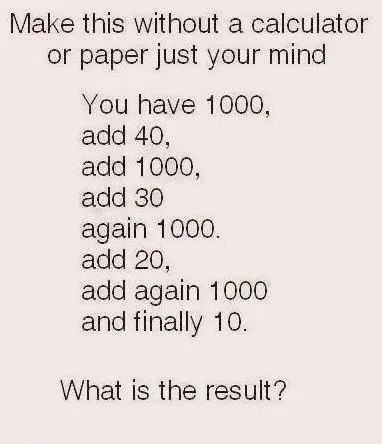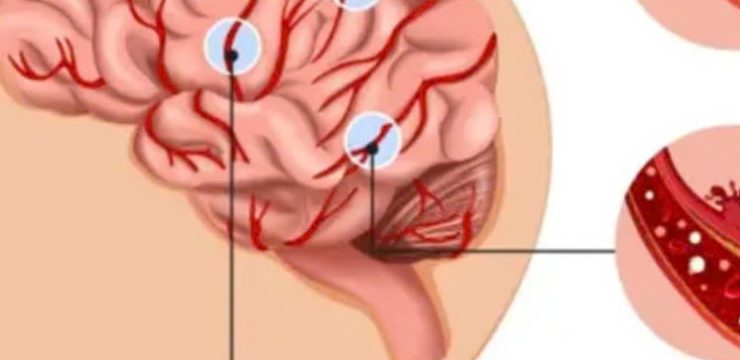Have you ever wondered about the true potential of your mind? Our brains are incredible tools capable of performing complex tasks, yet we often rely on calculators or other devices for even the simplest math problems. This article presents an engaging puzzle designed to challenge your mental abilities and give your brain a much-needed workout without relying on external tools.

The Puzzle
The challenge is simple but can easily trip up even experienced problem-solvers. It goes like this:
Start with 1000.
Add 40.
Add 1000.
Add 30.
Add another 1000.
Add 20.
Add a final 1000.
Add 10.
Most people rush through this mentally and confidently assume the total is 5000. However, the actual answer is 4100. This discrepancy happens because of how our brains process information quickly, often skipping over smaller details. Let’s break it down step by step to understand where people commonly make mistakes.
Breaking Down the Calculation
Let’s calculate it slowly and deliberately to avoid any confusion:
- Starting point: 1000
- Add 40: 1000 + 40 = 1040
- Add 1000: 1040 + 1000 = 2040
- Add 30: 2040 + 30 = 2070
- Add another 1000: 2070 + 1000 = 3070
- Add 20: 3070 + 20 = 3090
- Add a final 1000: 3090 + 1000 = 4090
- Finally, add 10: 4090 + 10 = 4100
The correct answer is 4100. Simple, right? But why do so many people make the mistake of thinking it’s 5000?
Why Our Brains Are Tricked
This puzzle is an excellent example of how our cognitive shortcuts can lead us astray. When we perform rapid calculations, our brains tend to group numbers in ways that can cause errors. In this case, our minds often focus on the larger numbers—the multiple 1000s—and quickly add up the smaller numbers like 40, 30, 20, and 10. When done too quickly, it’s easy for our brains to miscalculate and arrive at 5000 instead of the actual 4100.
This phenomenon is called cognitive overload. When our brains try to process too much information at once, we often rely on assumptions and mental shortcuts instead of precise calculations. As we add more numbers, our brains tend to simplify the process to save effort—and that’s where mistakes come in.
Strengthening Your Mental Math
Now that you understand how cognitive shortcuts can lead you to the wrong answer, it’s time to work on improving your mental math. The best way to avoid making these mistakes is to break calculations into smaller, more manageable steps and double-check each stage. Here are a few practical tips to sharpen your mental math skills:
1. Visualize the Numbers: Instead of allowing your brain to rush through the sequence, visualize each step as if you’re writing it down on paper. This can help you keep better track of the running total and reduce the likelihood of making mistakes.
2. Practice with Smaller Numbers: Start with smaller numbers to build up your confidence and accuracy. Once you master these, move on to larger sums. This gradual approach trains your brain to handle bigger calculations effectively.
3. Stay Calm and Take Your Time: Cognitive overload often happens when we’re rushing to solve a problem. Take a deep breath, slow down, and tackle each step one at a time. Patience can make all the difference in avoiding common errors.
4. Use Estimation When Appropriate: Estimation is helpful for getting a general idea of the answer quickly. While estimation isn’t suitable for precise calculations, it’s a great way to gauge if your final answer seems reasonable before double-checking the details.
5. Practice Regularly: Like any other skill, mental math improves with practice. Set aside time each day or week to solve puzzles and math problems. The more you practice, the more natural and accurate mental math will become.
The Importance of Keeping Your Brain Sharp
Just as physical exercise keeps our bodies healthy, mental challenges keep our minds sharp. Engaging in puzzles like this strengthens cognitive function, enhances problem-solving skills, and improves focus. Regularly challenging your brain with exercises like mental math also helps reduce the risk of cognitive decline as you age.
In today’s world, where we often rely on technology to handle our calculations, it’s important to take time to reconnect with the capabilities of our own minds. Mental math challenges like this one are not just exercises—they are opportunities to give your brain a workout and reconnect with your natural problem-solving abilities. The next time you’re tempted to reach for your phone’s calculator, consider giving your brain a chance to tackle the problem instead.
Conclusion
The mental math challenge presented here is more than just a simple exercise—it’s a reminder of the incredible potential our brains hold. It’s easy to reach for a calculator to solve basic math problems, but working through them mentally can help keep your brain active and engaged. If you found yourself tricked by the 5000-answer mistake, don’t worry—you’re certainly not alone. Just remember, the next time you face a similar challenge, to slow down, visualize each step, and approach the task one calculation at a time. Not only will you get the right answer, but you’ll also give your brain the healthy workout it deserves.





